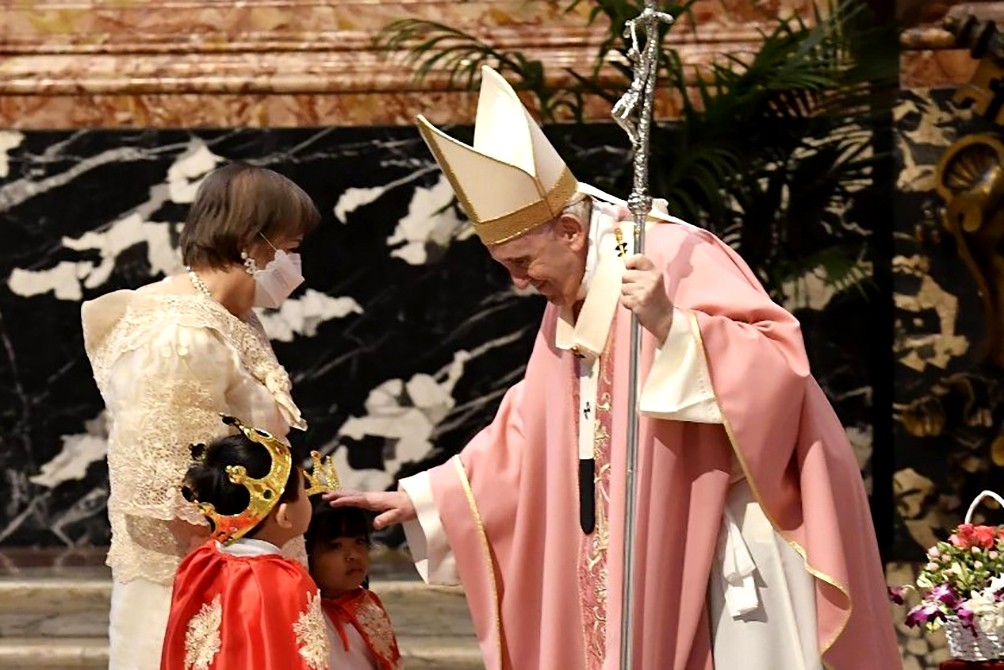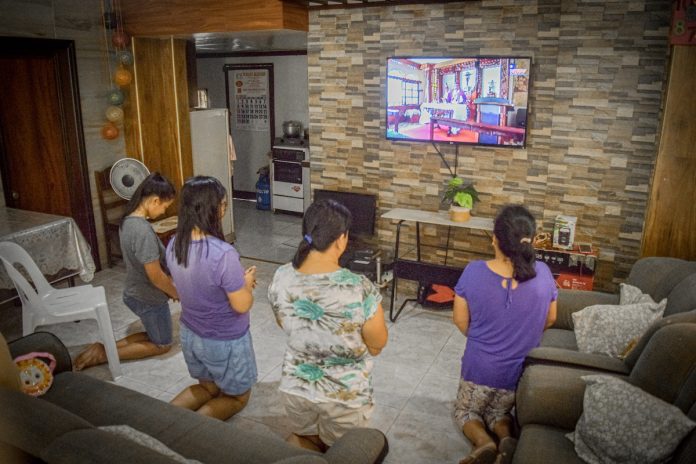Brothers and Sisters in Christ,
The coronavirus pandemic of 2020 continues to disrupt our lives as individuals and as a country. We have suffered much and lost many lives. Nevertheless, our Christian faith encourages us to hope and to sacrifice all the more so that our families and communities may live and thrive in “a free nation, nurturing a civilization of life and love.” We, Filipino Catholics, continue to hold that “The family is meant by God to be the first school of discipleship where the parents are the first catechists of their children” and “the first school of evangelization where the members learn to share with others the grace and light of Christ.”
5 Years of Amoris Laetitia
Thirty-five years after Pope Saint John Paul II blessed us with his Apostolic Exhortation Familiaris Consortio on the role of the Christian family in the modern world (22 November 1981), Pope Francis gifted us with his Apostolic Exhortation Amoris Laetitia on love in the family (19 March 2016). The Holy Father noted that “This Exhortation is especially timely in this Jubilee Year of Mercy. First, because it represents an invitation to Christian families to value the gifts of marriage and the family, and to persevere in a love strengthened by the virtues of generosity, commitment, fidelity and patience. Second, because it seeks to encourage everyone to be a sign of mercy and closeness wherever family life remains imperfect or lacks peace and joy” (n. 5).
Since then, the Family and Life Apostolate/Ministry in the Philippines has sought to implement the recommendations of the Synods on the Family and the teachings of Familiaris Consortio (FC) and Amoris Laetitia (AL). Significant among the many worthy initiatives on various levels – BEC, parish, vicariate, diocesan, metropolitan province, regional, national – are the following:
• In February 2016, representatives of Arch/Diocesan Family and Life Apostolates/Ministries (FLAMes) and of National Family and Life Organizations (NFLOs) resolved “to walk the path of pastoral accompaniment that is founded on truth and charity, proceeds with discernment and discretion, and seeks integration and full participation in the life of Christ and his Church; and to build pastoral networks that will equip all those you call to promote your will for marriage and family so that we may bring the Gospel of the Family to all levels of society and of the Church, especially in the existential peripheries.”
• In May 2016, the FLAMes and NFLOs reviewed the marriage preparation programs and recommended that couples accompany couples and agreed on six essential elements: personhood, communication, fruitful love, community, Christian marriage and spirituality of communion. This ongoing update of the marriage preparation programs in the Philippines has been called Cana 101.
• In February 2017, the National Conference of the Episcopal Commission on Family and Life (ECFL) focused on accompaniment and proposed the integration of family and life organizations into diocesan and parochial programs and structures so that the parish can truly become a “family of families” (AL n. 202).
• In February 2018, the ECFL National Conference focused on discernment and offered pastoral responses to violence and abuse in the family, pastoral accompaniment of substance abusers and their families, and pastoral accompaniment of migrants and their families.
• In February 2019, the ECFL National Conference focused on integration and explored how to synergize the family and life apostolate with the youth apostolate in order to “help young people discover the dignity and beauty of marriage” (AL n. 205).
• During the pandemic lockdown of 2020, the Family and Life Apostolate continued in creative ways. For example, online marriage preparation courses were developed. Counseling and accompaniment responded to the new challenges.
• The Family and Life Apostolate has expanded to include not only the formation of couples for marriage and advocacy for family and life in the public sphere, but also transparochial communities, prayer groups or circles, and influencers in mass and social media. Our most recent partnerships have been with Catholic Grandparents Association, Courage Philippines, Alliance for the Family (ALFI), schools of theology and centers for family ministries.
• The ECFL was also restructured in order to include Bishop members who are responsible for every region: Northern Luzon, Central Luzon, Southern Luzon, the Visayas and Mindanao.
• We also note the active involvement of our laity who advocated for the family in cases before the Supreme Court, the Senate, the House of Representatives and other government agencies. As an example, the CBCP awarded the Bishop Jorge Barlin Memorial Cross to Atty. Maria Concepcion S. Noche for successfully advocating for the removal of unconstitutional provisions in the Reproductive Health Law.

The Year “Amoris Laetitia Family”
To celebrate the fifth anniversary of Amoris Laetitia, the Holy Father has called for a Year “Amoris Laetitia Family” (19 March 2021-26 June 2022), with the following goals:
1. Share the content of the Apostolic Exhortation Amoris Laetitia more widely, to let “people experience the Gospel of the family as a joy that fills hearts and lives” (AL 200). A family that discovers and experiences both the joy of having a gift, and of being a gift for the Church and society, “can become a light in the darkness of the world” (AL 66). And the world today certainly needs this light!
2. Proclaim that the sacrament of marriage is a gift and contains in itself a transforming power of human love. For this purpose, pastors and families must journey together with a sense of co-responsibility and pastoral complementarity between the different vocations in the Church (cf. AL 203).
3. Enable families to become active agents of the family apostolate. To this end, “an effort at evangelization and catechesis inside the family” (AL 200) is required, since a family of disciples turns into a missionary family.
4. Make young people aware of the importance of formation in the truth of love and in the gift of self, with initiatives dedicated to them.
5. Broaden the vision and scope of the family apostolate to embrace a cross-cutting approach, including married couples, children, young people, the elderly and situations of family fragility.
The Dicastery for Laity, Family and Life proposes 12 ways of “Walking with Families” in the light of Amoris Laetitia:
1. Strengthen pastoral programs for marriage preparation with new catechumenal itineraries at Diocesan and Parish levels (cf. AL 205-222), in order to offer remote, proximate, and immediate marriage preparation, as well as accompaniment of new spouses in the first years of their marriage. This responsibility is especially entrusted to married couples who, together with pastors, become companions on the journey for engaged couples and those new to married life.
2. Foster the pastoral ministry of accompaniment of spouses, by means of formation encounters and times dedicated to prayer and spiritual development, so that spouses may gain awareness of the gift and grace of the nuptial sacrament. (cf. AL 58-ff. And 223-230).
3. Organize meetings for parents on children education and current challenges (cf. AL 172-ff. and 259-290), in response to the advice of Pope Francis, who suggests that parents try to understand “where children are in their journey”. (cf. AL 261).
4. Promote meetings for reflection and discussion on the beauty and challenges of family life (cf. AL 32-ff. and 89-ff.) which should expand horizons both in terms of recognizing the value of the family on a societal level; as well as in creating well-established networks of pastors and families who, by their own sharing and witness, can accompany those who are struggling.
5. Enhance the accompaniment of couples in crisis, (cf. AL 232-ff.) to form them into an attitude of resilience, which will help them see challenges as an opportunity to become stronger and grow in love.
6. Involve married couples into Diocesan and Parish structures to set up family ministry (cf. AL 86-88), and rethink the formation of pastoral workers, seminarians, and priests, so that they may fruitfully collaborate with families and live up to the challenges of today’s world (cf. AL 202-ff.). To this end, it will be important to foster reciprocity between the “family-domestic Church” and the Church (AL 200), so that each may mutually discover and value each other as an irreplaceable gift.
7. Promote a missionary vocation in families (cf. AL 201, 230 and 324) by creating times for formation in evangelization and missionary initiatives (e.g., on the occasion of children’s reception of the sacraments, during marriage preparation, anniversaries or important liturgical moments).
8. Develop programs of pastoral care of the elderly (cf. AL 191-193) which seek to overcome the “throw-away” culture and societal indifference, and promote initiatives that build bridges across the different stages of life, while also making the elderly into active agents within the pastoral care of the community.
9. Incorporate youth ministry into initiatives, which reflect upon and discuss issues such as family, marriage, chastity, openness to life, the use of social media, poverty, and respect for creation (cf. AL 40). We must succeed in sparking young people’s enthusiasm, in enhancing their ability to commit themselves fully to great ideals and face the challenges that such ideals entail. Special attention should be paid this year to children, in order to make them aware of the Year of “Amoris Laetitia Family” and suggested initiatives.
10. Encourage preparation for the X World Meeting of Families with catechesis and training itineraries, which will provide accompaniment for families towards the meeting with the Holy Father, through various steps and experiences.
11. Launch initiatives of accompaniment and discernment of wounded families, (cf. AL 50-ff., 241-ff. and 291-ff.) to help them discover and carry out their mission within their family and in the community, starting from their Baptism.
12. Organize meetings in Parishes and communities involving groups for an in-depth study of Amoris Laetitia, in order to raise awareness of the concrete pastoral opportunities that occur in individual ecclesial communities (cf. AL 199-ff.).

30 Years of PCP-II
We marvel at how these proposals are harmonious with the agenda that our Bishops proposed – and Pope Saint John Paul II approved on 11 April 1992 – for the Family during the Second Plenary Council of the Philippines 30 years ago:
Article 46. §1. A continuing education for Filipino families in accordance with Catechesi Tradendæ and Familiaris Consortio, should be undertaken and Family Life seminars like Pre-Cana, Pro-Life, Marriage Encounters should be made part of diocesan/parish pastoral programs.
§2. Diocesan family centers must be established; in these Filipino elements of spirituality are to be developed in the context of a general spirituality of Christian marriage.
§3. Under the direction of the local Ordinary, there should be available in dioceses and parishes a competent team, including priests and Catholic couples to help promote effective pastoral care of the family and provide family counseling.
§4. Christian families should be a countersign to the manipulative anti-life culture, through a strengthened family spirituality which is pro-life.
Article 47. The Church should formulate pastoral programs for those in broken homes and families, adhering to the norms outlined in Familiaris Consortio, 83 and 84.
Article 48. The family is to be regarded as the basic unit of Christian life. Hence it must be viewed as both subject and object of evangelization; for evangelization begins in the family and family catechesis must be part of the fostering of BECs.
Article 49. §1. Greater cooperation for formation in Christian values should be fostered between schools and families.
§2. Programs for the prevention of exploitation of women and children based on a Christian concept of love and family life should address primarily the formation of Filipino family in Christian values and the strengthening of those values; it should also include pastoral care after marriage as outlined in Christifideles Laici, 69.
§3. Problems affecting homosexual individuals and behavior should be given due attention in accord with the pastoral norms of Homosexualitatis Problema of the Congregation for the Doctrine of the Faith issued on 1 October 1986.
500 Years of Christianity
As we mark the 500 years since the first Easter Eucharist and the first Baptism in the Philippines, we note that the kerygma was first preached by a layman, Ferdinand Magellan, in response to a family matter:
The captain told them that God made the sky, the earth, the sea, and everything else, and that He had commanded us to honor our fathers and mothers, and that whoever did otherwise was condemned to eternal fire; that we are all descended from Adam and Eva, our first parents; that we have an immortal spirit; and many other things pertaining to the faith. All joyfully entreated the captain to leave them two men, or at least one, to instruct them in the faith, and [said] that they would show them great honor. [8]
In gratitude to all who responded heroically to the Holy Spirit’s impetus to share the Gospel with us, we, the pueblo amante de María, consecrate our families and our nation to the Blessed Virgin Mary, Mother of God and Mother of the Church, and to St. Joseph, Guardian of the Redeemer, Patron of Workers and Patron of the Catholic Church
Jesus, Mary and Joseph,
in you we contemplate
the splendour of true love;
to you we turn with trust.
Holy Family of Nazareth,
grant that our families too
may be places of communion and prayer,
authentic schools of the Gospel
and small domestic churches.
Holy Family of Nazareth,
may families never again experience
violence, rejection and division;
may all who have been hurt or scandalized
find ready comfort and healing.
Holy Family of Nazareth,
make us once more mindful
of the sacredness and inviolability of the family,
and its beauty in God’s plan.
Jesus, Mary and Joseph,
Graciously hear our prayer.
Amen. For the Catholic Bishops Conference of the Philippines,
+ Romulo G. Valles, D.D.
Archbishop of Davao
CBCP President
19 March 2021









